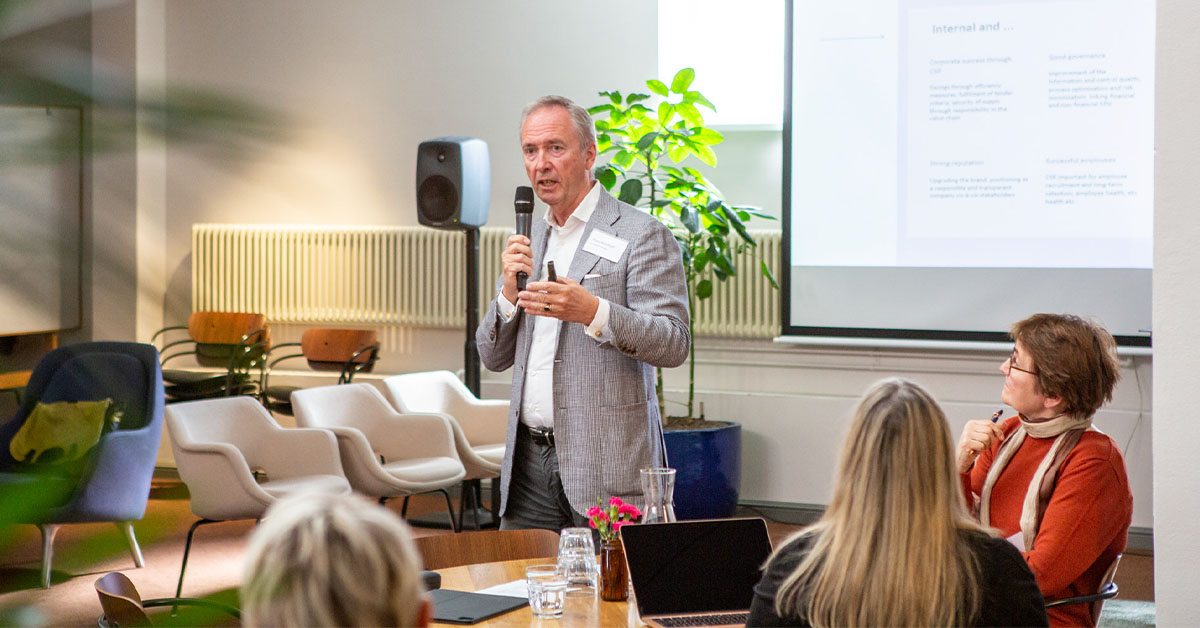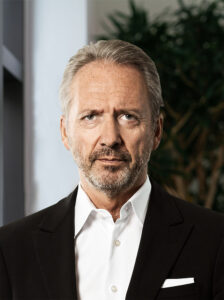Article series vol. 1/4
Medita Communication, which represents the Worldcom PR Group in Finland, asked its international communication agency partners how critical they and their key clients consider the demands for sustainable business in their markets and how sustainability expectations are reflected in corporate communications.
Medita Communication together with its Worldcom PR Group partners assessed the situation in Finland, Sweden, Germany and Great Britain. Are companies already in a hurry with their ESG work, and how are sustainability expectations affecting communications?
Focus on Germany: ESG is the most sensitive aspect of communications
“Whether companies are big or not, they have to deal with ESG,” says Klaus Kirchhoff, founder of Kirchhoff Consult AG, which was established in Hamburg, Germany, in 1994.
Before starting his consultancy, he practised as a lawyer. Over the past decades, Kirchhoff Consult has become a leading consultancy for ESG, Integrated Reporting and IPOs in the EMEA Region.
Big corporations have been implementing their environmental, social and governance (ESG) strategies for some years already. To achieve their goals, they expect measurable sustainability also from their suppliers. We can see various stakeholders increasing pressure, while regulation too is expected to become even stricter. This does not apply only to big corporations, but also to small and medium-sized enterprises.
To ensure that they are future-proof, all companies should wake up and take action to improve their ESG performance.
Klaus Kirchhoff points out that banks have already started to ask for an ESG report or an ESG strategy. If a company does not present one, they do not get the same credit conditions as they would with proper ESG readiness. This is why smaller companies are also starting to contact their agency experts about ESG.
“I am working with capital market investors on two start-up IPOs now. Banks tell us that without ESG, these IPOs would not be possible. So independent of the company size, ESG is a must. Smaller companies are not used to it and have no management capacities to handle this topic, but they still need to act,” he says.

Despite doubts and criticisms, ESG is here to stay

Even though there has been some criticism and hesitation regarding the urgency of ESG due to the energy crisis and inflation, Klaus Kirchhoff is convinced that ESG is here to stay. The change is being driven by both EU regulations and market developments. Klaus Kirchhoff estimates that smaller companies have time until 2026 with their ESG reporting, but in the case of companies that are in the capital markets, investors will not wait.
“Why should they wait if there are companies that are already compliant?” he asks.
Creating a fundamental ESG strategy takes four to six months, plus an additional two months for rating before the first ESG report can be done. Klaus Kirchhoff’s advice is clear.
“I would start at once! Do not wait for new regulations. It is not only financial companies; big companies expect ESG actions from their suppliers. It is a strategic success factor, and it should be done as soon as possible.”
Growing demand for expertise in supply chain management
Kirchhoff Consult develops ESG strategies for companies in the EMEA region. The strategies are needed to develop concepts, timetables and KPIs, for example: “We want to increase the number of female employees in leading positions by 50% in 5 years”. The ESG strategy also describes how their actions will help achieve the targets, how their concept will be realised, or how it needs to be changed depending on the changing world.
Where are the most urgent needs in terms of improving both the actual ESG factors and communicating them to those who matter?
The focus is currently on so-called Scope 2 emissions, which defines how corporations measure greenhouse gas emissions from purchased electricity, steam, heat, and cooling. Klaus Kirchhoff notes that this will be increasingly important in the coming years. His agency already focuses on the supply chain of their clients, as a new law on responsibility in the supply chain – the German Supply Chain Due Diligence Act – entered into force in January 2023.
According to the act, big companies must have control of social and environmental standards regarding their operations, as well as their suppliers worldwide. In case of human rights violations, they also need to act. They are expected to have risk management systems and grievance processes in place and to report on their progress.
Kirchhoff Consult recently hired an additional expert in supply chain management for this reason and noticed that everybody seems to be looking for the best ones now. Investing in best competencies and both reporting and reducing greenhouse gas emissions is not enough, however. Continuous improvements are needed to protect biodiversity and to take care of people’s health and safety while still conducting financially profitable business.

Communication is the key to success
According to Klaus Kirchhoff, companies regardless of their size are more and more mature in investing in ESG, as well as in communications and reporting their development. As an experienced senior advisor, he sees communication as being the key to success. He refers to the equity story and integrated reporting, according to which it is important to make the ESG dimensions visible to the market by means of communications, presentations, websites, and reporting.
Strategic advice needs qualified people, so the prices of the service are higher, he notes. Once the strategy is in place and the implementation starts, however, the pricing is more in line with classical communications.
“To get an ESG rating, the investment is about 30,000 euros, and an additional 15,000 euros for managing the process. At stock exchanges, companies with an ESG strategy get more investors with ESG criteria and eventually better positioning in the market. It is not a cost but an investment,” he adds.
“Getting an ESG-rating is not a cost but an investment”, Klaus Kirchhoff says.
He underlines that ESG and communicating it will become more important, as this information is vital for investors and banks. It is also vital in terms of the pool of talent looking for an appealing purpose.
“The purpose and culture of a company are very important for attracting talented people planning a career path,” he reminds.

It is more important than ever to be truthful
A successful ESG strategy requires ongoing improvements as well as ongoing communications.
“When the ESG rating starts, the rating may be middle risk, but the aim must be low risk. This means that within the next few years, they must go to low risk to get better credit conditions, so this is an ongoing process,” Klaus Kirchhoff explains.
How well do the ESG service providers in the European market respond to these needs? According to Klaus Kirchhoff, big players like Deloitte, EY, KPMG, and PwC are investing a lot in good people to enter the market.
“The staff they have is not capable of these services, and they need to hire people specialised in ESG. The problem is, there are not enough,” he says.
PR agencies willing to work in this field also must invest in new competences. Klaus Kirchhoff refers to a big client, a European company based in Germany, that first hired a sustainability agency in London.
“The result was just typical PR blah-blah, so they did not publish it at all. PR and communications of the past are not going deep enough and are not reliable. It is more important than ever to be truthful and trustworthy,” he emphasises.
“PR and communications of the past are not going deep enough and are not reliable. It is more important than ever to be truthful and trustworthy”, Klaus Kirchhoff says.
His own agency hires people with a sustainability background who then learn communications within their teams. After six months they are competent, because the teams have so many projects ongoing.
When experts at Kirchhoff Consult develop an ESG strategy, they ask the client very critical questions about their progress. Kirchhoff points out that this must be communicated openly, and if they do not meet their targets, they must explain why not – and what actions they will take to succeed in the future.
“It has to be very clear and fact-driven, and they should not try to paint better pictures than what the reality is.”
Klaus Kirchhoff believes good communications always add value. If a company is under-valued, it is because it is under-communicated, he says.
“For a fair valuation of a company, I need to present all the information in an objective way so that the investor will find the best valuation. The investor will be happy if the value of a company is not overestimated, because the long-term perspective is so important.”
Written by: Tiinu Wuolio
Published: 23th March 2023











